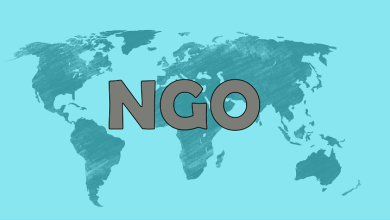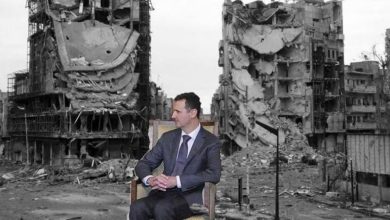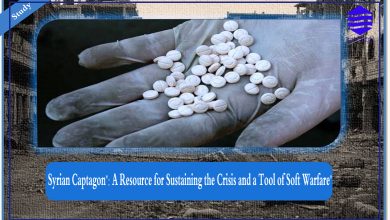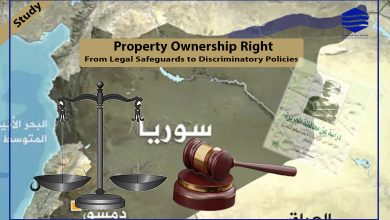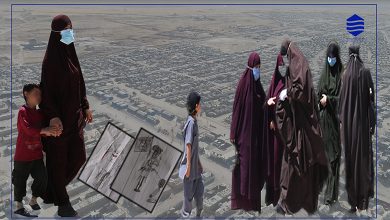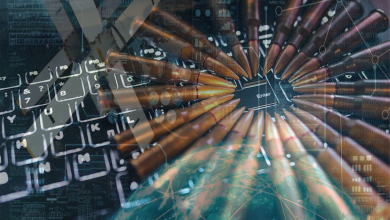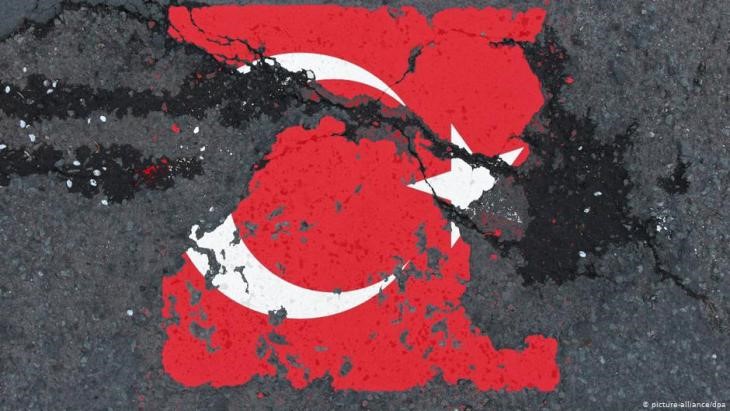
Turkey from “Zero-Problems” to “Global-Problem”
Al-Furat Center for Studies-Translation Department
Also Available In (Arabic)
Introduction:
It is noteworthy that the focus on the Syrian crisis began to decrease, when it used to be in the forefront of news bulletins and took a wide space in discussions; the agendas, whether at the local or global level. By turning attention to new places and hot spots where conflicts are raging, such as tension in the eastern Mediterranean, Libya and Nagorno Karabakh, which have one common ground, which is Turkey’s Justice and Development Party(AKP).
Turkey has tried to be a power whose role cannot be overlooked in the potential solutions to many crises that have originated in the countries of the region, as it has carried out many adventures with inconclusive results. In addition to its an obvious changes in its foreign policy; it moved from the principle of “zero problems” with the neighbors to an increase in problems, until its name and the name of its president are repeated in every single thing in the region, whether on an occasion or not.
Turkey’s Strategic Role
Many think that Turkey’s Justice and Development (AKP) is still maintaining its strategic position today due to its important geopolitical position to the global politics. It was previously considered one of the important pillars, in which the global order and the dominant powers depend on, by virtue of this position and being a member state in (North Atlantic Treaty Organization) NATO. The prevailing belief was also that Turkey, like Israel, is considered one of the important constants that cannot be neglected or turned a blind eye by the world powers, but this role has declined for many reasons, including:
The military interventions of the United States and its allies in the region over the past two decades have proven; The scarcity of reliance on Turkey-based US military bases and the NATO base, especially after the Turks prevented the Americans from using the Incirlik base in the US-led attacks on Iraq in 2003. Consequently, the US was able to play down the importance of the Turkish ally in the region, especially in light of the availability of other alternatives in the region.
The Government of Justice and Development adopted the economic openness policy towards the Global Capital during the first decade of its rule, however, it subsequently began to converge, and attempts to tighten procedures for the access of foreign investments into the country, and to crack down on those that already existed at home, by adopting an alternative capital policy; or the so-called “Green Capital” i.e. Justice and Development (AKP)’s Capital
Moving away from the values that NATO adopts and from the principles of the European Union, and adhering to the radical ideology and adopting an expansionary project to revive the “glories” of the Ottoman State, in accordance with the objectives and policy of the “New Ottomanism”.
Deviation from the path that was set by the world powers that had led the (AKP) to come to power in Turkey, due to the arrogance of its president, and his attempts to emancipate, or evade from his obligations towards those powers.
The accumulation of internal problems since the beginnings of the Turkish Republic, its exacerbation during the government of (AKP)’s era.
Shifting from the “Zero-Problems” policy to the adoption of “Neo-Ottomanism“
The Government of Justice and Development (AKP) practiced the policy of “Zero-Problems” in order to build good relations with the countries of the Middle East. However, its adoption of the “New Ottomanism” project, which is centered around the idea of reaching most of the areas that were previously under the control of the Ottomans, prompted it to interfere in many countries affairs. By taking advantage of the chaos that emerged with the “Arab Spring” revolutions regionally, and the Greater Middle East project globally, considering both of them an opportunity for Turkey to regain what it has lost at the end of the (World War I), and in the agreements that followed it.
However, the presence of deterrent powers to these expansionist policies has thrown Turkey into a great spiral and very dangerous contradictions. This led to the loss of many allies of hers, in which it has global frameworks with them such as the NATO’s umbrella, and new alliances began to be formed based on these developments. Turkey used to have strong relations with many important countries regionally and globally, is now isolated, and its movements remained confined within the framework of radical armed groups, such as ISIS, the Al-Nusra Front, Al-Qaeda and the Muslim Brotherhood, and its sponsor states such as Qatar. These moves within this axis have made Turkey a center that attracts the forces of global and regional terrorism, which have become an international problem, which the whole world is making great efforts to combat. Hence, Turkey, which used to advocate a policy of “Zero-Problems,” has become the problem itself, given its clear and close link with global terrorism.
Playing on ropes in Turkish foreign policy
None of successive governments of Turkey reached the level of evasiveness and playing on ropes more than the government of justice and development. This government was able to play on global, regional, and even internal contradictions. Nevertheless, what is evident is that these acrobatic movements crack down on itself, because in such circumstances or the so-called “crisis stage”, each of the conflicting parties must clearly define the identity of whom it considers an “enemy”. For example, Israel considers Iran to be its a formidable enemy, therefore, Turkey can no longer play in this space between the “two enemies”, due to the difficulty of being in a regional alliance with Iran and with Israel at the same time. Accordingly, Turkey must identify the party that is important to it, and strengthen its relations with it. because the intensification of conflicts and contradictions in the region, will no longer allow Turkey to continue its policy that was represented by playing on several ropes at the same time. Turkey is at a crossroads.
Turkey and the Hegemony Struggle
Nearly a century ago, the borders of the countries of the region were drawn through the Sykes-Picot Agreement in 1916, and some terms of this agreement were applied in practice in the Treaty of Lausanne in 1923, and a kind of consensus and balances were created between these countries, whether they liked or that they had to accept it. However, with the introduction of the idea of redrawing the political maps of the region according to subsequent projects, Turkey began trying to take advantage of the tensions, to revive its expansion dreams that were postponed.
In the Middle East, three regional countries are struggling to gain hegemony, namely Iran, Israel and Turkey, each of which uses its tools to become the first regional power to be reckoned with in future plans.
Iran, through its endeavor to build its Shiite Crescent, has begun to crack down on the interests of many countries, whether they were the interests of the region’s countries, or the interests of international powers such as the United States and others.
As for Israel, it is considered a red line according to the World Order, and one of the constants that the major hegemonic powers could wage (world War III) for its sake in order to protect its interests.
The “Abraham” agreement [1] came to activate the Israeli role in the Middle East, to strengthen it as a hegemonic power throughout normalizing relations with the Arab countries, and to derail the Turkish state, which was showing itself as an important ally of Israel on the one hand, and its fatherhood to Palestine and Hamas, on the other hand. Where many of the gaps that were being exploited by Iran and Turkey in this context will be filled, and the process of imposing Israeli hegemony on the region will begin as a leading country that leads the Middle East and will be a main axis of global issues related to the region.
The third regional State is Turkey led by the Justice and Development Party, has expressed its intentions on more than one occasion to reach the level of “the hegemonic regional power” and to reach the ranks of a “global power”, through the idea of the “New Ottoman” policy and the attempt to lead the world of Sunni Islam. Erdogan has exploited the existing chaos in the region in order to achieve these objectives, relying on some tools, including the formation of a “Janissary Army” of mercenaries and reliance on armed groups designated on global terrorist lists, such as ISIS and the Al-Nusra Front. By using them as means to pave the way for its army to enter the areas, it aspired to reach, and establish military bases in it. Thinking that Turkey’s large possession of military bases in the region will make it a great power, as it is the case for the United States of America. Through these interventionist policies, he seeks to resemble the United States and not others.
Hence, the Turkish state practiced a policy of maximum pressure in the region. In order to achieve its objectives that it aspires to achieve, by dragging them to its arena to force them to open the door to negotiations with it and impose its demands on them. However, it is very clear that the consequences were opposite, in which the international powers have practiced the policy of turning the blind eye towards its disregard in the region. By threatening the interests of many of these countries, thus, it became a global problem after its policy failed, and magic began to turn on the magician, as the economic conditions are at the rock bottom. In addition to the emergence of features of the formation of international fronts against these Turkey’s orientations, and one of these pressures for its intervention in the Eastern Mediterranean, in order to find a foothold in that region, In order to obtain the gas of the Mediterranean basin. However, this harmed the interests of many important countries, such as the European Union, Egypt, and the Arab Gulf States, and the result was the creation of an alliance amongst these countries to limit Turkish interventions. The purchase of the Russian S-400 missile system is also one of the aspects of Turkey’s maximum pressure policy. The Turkish army entirely armed with NATO weapons, and the Turkish government by buying a weapon that can only be used in one condition that if the military system of the army is changed to a Russian military system. This carries several interpretations; including that this might be a tool of pressure on NATO itself, to show powerful positions, towards its ally, in its problems, which is what has not happened yet.
Turkey’s future in NATO
Today, Turkey is exploiting its membership within NATO to put maximum pressure on its “ally” countries, as it did in the past, to achieve its objectives, until it reached the point of exaggeration and indulging. It calls for NATO’s help in all the battlefields that it ignites, to escape its internal crises that live. This led to the actor states in the alliance to introduce a new discussion about the importance of NATO, or the reference to NATO’S “brain-dead”, as described by French President Emmanuel Macron.
NATO has become suffering from a clear crack in its structure, therefore, it has become imperative to get rid of the burden of many countries, and this can be achieved by building a new defense structure, given the change in the concept of “ally” countries at this stage.
We find that many countries are allies of the global hegemonic powers, but at the same time, they are outside the framework of NATO. We also find that countries considered “allies” in NATO are flying out of the tune, as it is the case with Turkey. Therefore, it is likely that we will witness the establishment of a new defensive alliance in the world. What illustrates this belief is the statement by the former US Secretary of Defense Mark Esper, in which he said: “that NATO is no longer useful, and that it is necessary to search for a more comprehensive defense structure or what he called “globalized defense.”
The important question here is. Will Turkey’s “justice and development” be part of this structure?
It seems clear that Turkey, which is suffering under the burden of internal and external problems, cannot be part of the new global defense system, given that the front that will form the global defense force’s orientations contradict Turkey’s expansionist ambitions.
Possible scenarios for Turkey
The opportunity was opened for Turkey to intervene in many sensitive areas in the world, which in turn, led to the formation of pressure on the interests of many countries, until Erdogan’s Turkey became a global problem that must be resolved, so what are the scenarios that Turkey could face?
Turkey had the possibility to choose the Big Easy at this stage, which is to return to commitment to the values and principles of NATO, and to stand by the hegemonic powers globally. However, it seems this is no longer available now following the adventures Erdogan has undertaken in the foreign political arena. This will require Turkey’s Justice and Development to solve many pending problems, both internal and external ones. However, the solution to any problem now is linked to the collapse of the regime that was built by Erdogan. He built his regime to remain in power forever in Turkey’s rule; he organized everything to achieve this objective, as he changed the state’s constitution, leaving no room for reform or rehabilitation, which means that he built a new republic on the ruins of Ataturk’s secular republic, namely the Republic of Justice and Development. By following in the founding of this republic a policy of the brinkmanship, to the extent that he did not leave any possibility to take a step back, because this retreat will determine his fate personally. Therefore, this option or possibility has become one of the most difficult options for him at present time, because it will directly determine the fate of Erdogan.
Another possibility awaiting Turkey is the fate that Germany faced in the aftermath of the (World War I). Because the government of Justice and Development was overly drawn into many battlefields. History tells us how Germany was burdened with losses of war. Turkey might face a possible fate, due to its expansion of the scope of battlefields in many regions. It is likely that all countries affected by Turkey’s reckless interventions will agree to put on Turkey the burden of the conflicts that it has ignited in Syria, Iraq, Libya and Karabakh. In addition to its intervention in the Mediterranean region, and confirming the fact of its direct and indirect support for global terrorism.
Turkey has been living in a status of suspicious isolation, after it has become an almost global problem, and it has negatively affected many international interests, which created a wide front of Turkey’s “enemies”, this is reflected in the global media trend against the Erdogan’s Regime, and this reminds us of the fate of the arrogant rulers in Region. Accordingly, it is possible that Turkey’s situation will be like “Syria’s situation” by igniting an internal conflict in it, as happened in Syria, given that the conditions are right for the Turkish interior to explode due to the increase in internal problems, which we can count as follows:
The issues of nationalism for the oppressed peoples inside Turkey, such as the Kurdish issue, and the issues of other ethnic components that the state denies their national identity.
Issues of democracy and freedoms in Turkey, which are mainly based on suppressing and restricting freedoms, whether it is religious freedom, freedom of speech, freedom of thought and others, which have been documented by international human rights reports, and it is the same issue that constituted an obstacle to Turkey’s accession to the European Union as well. Turkey also uses elections as a means of alleged democracy, simply cancels election results when these results are not in its favor, and this is what happened in the dismissal of mayors of Kurdish cities from members of the Peoples’ Democratic Party(HDP); an opposition party.
Financial and administrative corruption, as members of the ruling Justice and Development Party (AKP) benefit most from other jobs in the state, and this corruption is also represented in the dismissal of many employees from their jobs under the pretext of their association with Fethullah Gulen, or their relationship with the July 19 coup.
The status of the Turkish army; After the failed coup attempt, and the ensuing imprisonment of many of its members, the army is clearly divided between the tendency supported by Erdogan, and the tendency adopting the secular state culture, or the tendency affiliated with NATO.
Economic deterioration, which is considered the most important reason for increasing peoples’ frustration against their governments, as the Turkish lira reached its lowest levels since the Justice and Development Party took power, according to economic experts. High rates of inflation, thus, creating a status of economic instability that made Turkey an investment-repellent environment.
In conclusion … it is clear that all indications point to the failure of the Turkish Justice and Development Government’s policy to achieve its objectives, as the pressures used by Erdogan brought an opposite consequences, the most important of which is that Turkey has clearly become the center of global terrorism. The international actors affected by Turkey’s policy in the region are; Greece, Cyprus, Egypt, Israel, Saudi Arabia and the UAE have begun to form alliances and fronts against Turkish policy in the region. The opportunity to join the European Union is now more elusive than ever before. In addition to losing the confidence of its most important ally, the United States, after heading towards Russia, which is not a trustworthy ally.
Turkey’s foreign policy and its results have negatively affected the Turkish internal situation, as democracy and freedoms record an unrivaled deterioration in the history of the republic, and the Turkish lira declines daily, which further worsens the living conditions of the Turkish citizen. Who may lose patience at any time, thus, the Justice and Development government is internally and externally at a crossroads.
[1] The name embodies the religions of the three countries participating in the agreement: “Islam (the Emirates), Judaism (Israel), and Christianity (the United States of America), and these are the three monotheistic religions, or known as Abrahamic in relation to the father of the prophets, the Prophet Abraham, peace be upon him.
